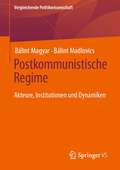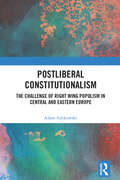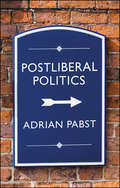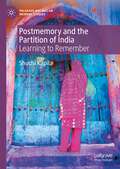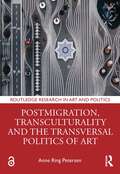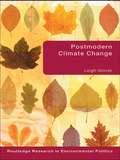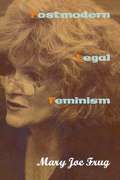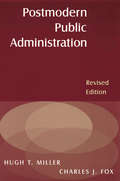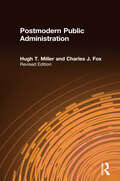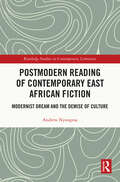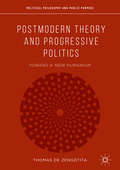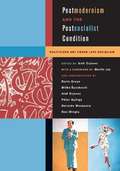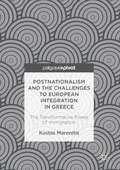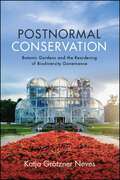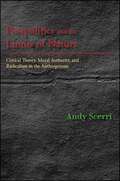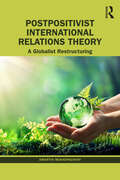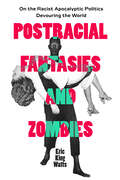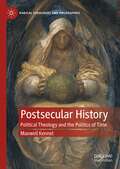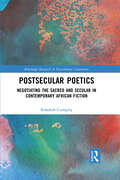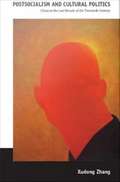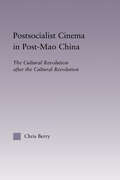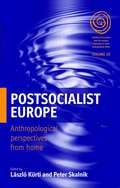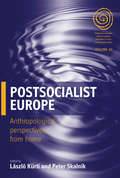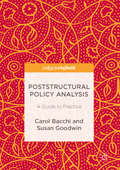- Table View
- List View
Postkommunistische Regime: Akteure, Institutionen und Dynamiken (Vergleichende Politikwissenschaft)
by Bálint Magyar Bálint MadlovicsIn 120 Thesen entwickelt das Buch einen konzeptionellen Rahmen mit einer Typologie post-kommunistischer Regime und einer detaillierten Darstellung von idealtypischen Akteuren und den politischen, wirtschaftlichen und sozialen Phänomenen in diesen Regimen. Befreit von den impliziten Annahmen der Mainstream-Demokratisierungstheorie liefert die neue Terminologie ein leicht verwendbares Instrumentarium eindeutiger Ausdrucksmittel, um über den Postkommunismus zu sprechen.
Postliberal Constitutionalism: The Challenge of Right Wing Populism in Central and Eastern Europe
by Adam SulikowskiThis book addresses recent changes in Central and Eastern Europe in order to critically consider the impact of illiberal conservatism on constitutionalism. Right-wing populism and the illiberal constitutionalism of Central and Eastern Europe have challenged both the dominant views of legal scholars and those elements of the legal mainstream that appeared to be firmly entrenched and resistant to change. But, as this book demonstrates, in practical terms, the anti-liberal right has made use of critical methods that were originally conceived as tools for use in emancipatory and left-wing action, absorbing and utilizing a great many of the ideas associated with critical jurisprudential thought. In short, this book maintains, conservative illiberalism has taken over the role that postmodernism could have played: the role of a ‘jester discourse’ relativizing the certainties and finality of liberal democracy. As the book argues, however, what this connection reveals is the necessity of a legal and political response that does not simply and hysterically reaffirm the former liberal hegemony. Rather, drawing on Foucault and post-Marxism, it articulates a concept of agonistic democracy that aims to shift the center of gravity in constitutional discourse away from any naive liberal faith in the nonpolitical. This book will appeal to constitutional lawyers, as well as to legal and political theorists with interests in contemporary populism and liberal thought.
Postliberal Politics: The Coming Era of Renewal
by Adrian PabstHyper-capitalism and extreme identity politics are driving us to distraction. Both destroy the basis of a common life shared across ages and classes. The COVID-19 crisis could accelerate these tendencies further, or it could herald something more hopeful: a post-liberal moment. Adrian Pabst argues that now is the time for an alternative – postliberalism – that is centred around trust, dignity, and human relationships. Instead of reverting to the mutual suspicion and destabilising inhumanity of 'just-in-time' free-market globalisation, we could build a politics upon the sense of localism and community spirit, the valuing of family, place and belonging, which was a real theme of lockdown. We are not obliged to put up with the restoration of a broken status quo that erodes trust, undermines institutions and trashes our precious natural environment. We could build a pluralist democracy, decentralise the state, and promote mutualist markets embedded in the everyday economy.This bold book shows that only a politics which fuses economic justice with social solidarity and ecological balance can overcome our deep divisions and save us from authoritarian backlash.
Postmemory and the Partition of India: Learning to Remember (Palgrave Macmillan Memory Studies)
by Shuchi KapilaThis book examines the memories of the Partition of India in 1947 with a focus on the generation of postmemory (those who came after it) and how partition experiences have been shared (or not) and understood. It explores the formal and narrative properties of different memory practices that have been built around the partition, and the methods of oral historians involved in collecting testimonies as part of the 1947 Berkeley partition archive.
Postmigration, Transculturality and the Transversal Politics of Art (Routledge Research in Art and Politics)
by Anne Ring PetersenThis is the first book to develop a postmigrant analytical perspective for the study of art, concentrating on how postmigration reopens the study of contemporary art and migration. The book introduces art historians and other scholars with a methodological interest in cultural analysis to the innovative concept of postmigration, offering a comprehensive introduction to the various meanings and uses of the term as well as translating it methodologically to an art historical context. The book analyses art projects from Denmark, Germany and Great Britain, which address some of the current challenges to European societies of immigration, and by drawing on theory from fields such as migration studies, transcultural studies and feminist, postcolonial and political theory, as well as re-engaging established concepts such as imagination, commemoration, belonging, identity, racialization, community, public space and participation. The book will be of interest to scholars working in art history, art and politics, migration studies, and transcultural studies.
Postmodern Climate Change (Environmental Politics #Vol. 11)
by Leigh GloverA much-needed analysis of international climate change politics as a key issue of modernity and in the context of environmentalism. Leigh Glover presents a new way to understand the climate change problem and is concerned with problems of modernity and postmodernity in the context of contemporary environmental thought. Focusing on the international politics surrounding the UN agreement of climate change, the Framework Convention on Climate Change and its Kyoto Protocol, Glover examines the issue using the key aspects of climate change science, global environmental politics, and global environmental management.
Postmodern Legal Feminism
by Mary Joe FrugA collection of eight essays by Mary Joe Frug, published posthumously. First Published in 1993. Routledge is an imprint of Taylor & Francis, an informa company.
Postmodern Public Administration
by Hugh T Miller Charles J FoxThis widely acclaimed work provides a lively counterbalance to the standard assessment-measurement-accountability prescriptions that have made showing you did your job more important than actually doing it. Now extensively revised, it articulates a postmodern theory of public administration that challenges the field to redirect its attention away from narrow, technique-oriented scientism, and toward democratic openness and ethics. The authors incorporate insights from thinkers like Rorty, Giddens, Derrida, and Foucault to recast public administration as an arena of decentered practices. In their framework, ideographic collisions and everyday impasses bring about political events that challenge the status quo, creating possibilities for social change. "Postmodern Public Administration" is an outstanding intellectual achievement that has rewritten the political theory of public administration. This new edition will encourage everyone who reads it to think quite differently about democratic governance.
Postmodern Public Administration
by Hugh T. MillerThis widely acclaimed work provides a lively counterbalance to the standard assessment-measurement-accountability prescriptions that have made showing you did your job more important than actually doing it. Now extensively revised, it articulates a postmodern theory of public administration that challenges the field to redirect its attention away from narrow, technique-oriented scientism, and toward democratic openness and ethics.The authors incorporate insights from thinkers like Rorty, Giddens, Derrida, and Foucault to recast public administration as an arena of decentered practices. In their framework, ideographic collisions and everyday impasses bring about political events that challenge the status quo, creating possibilities for social change. "Postmodern Public Administration" is an outstanding intellectual achievement that has rewritten the political theory of public administration. This new edition will encourage everyone who reads it to think quite differently about democratic governance.
Postmodern Reading of Contemporary East African Fiction: Modernist Dream and the Demise of Culture (Routledge Studies in Contemporary Literature)
by Andrew NyongesaThis book likens writers’ incessant focus on racism, negative ethnicity, patriarchy and social stratification in societies to a naïve physician who prescribes analgesics to treat symptoms while the underlying cause of the disease seethes in the blood. In the same way, persons who consistently blame their reckless conduct and shabbiness miss the point if they do not transform the actual cause of the problem: the mind. While most literary scholars problematise gender disparities, racial and political othering, oppression, environment degradation, education matters, poor parenting and governance, they tend to disregard the root cause: modernism. This book finds a gap in this grey area to address the authentic cause of the symptoms that most literary writers and scholars treat. Pertinent modernist tenets such as bureaucracy, the nation state, systematisation and rationality, and dualism are at the heart of racism, corruption and other aforementioned symptoms. It is the contention of this study that postmodernism offers a comprehensive understanding of modernism to mitigate its effects on society.
Postmodern Theory and Progressive Politics: Toward a New Humanism (Political Philosophy and Public Purpose)
by Thomas De ZengotitaThis book examines the lasting influence of the academic culture wars of the late 20th century on the humanities and progressive politics, and what to make now of those furious debates over postmodernism, multiculturalism, relativism, critical theory, deconstruction, post-structuralism, and so on. In an effort to arrive at a fair judgment on that question, the book reaches for an understanding of postmodern theorists by way of two genres they despised; and hopes, for that reason, to do them justice. The story, in its telling, justifies two basic claims: first, that the phenomenological/hermeneutical tradition is the most suitable source of theory for a humanism that aspires to be truly universal; and, second, that the ethical and political aspect of the human condition is authentically accessible only through narrative. In conclusion, it argues that the postmodern moment was a necessary one, or will have been if we rise to the occasion—and that that is its historical significance.
Postmodernism and the Postsocialist Condition: Politicized Art under Late Socialism
by Ales ErjavecThis book, with in-depth perspectives on art and artists in the former Soviet Union, captures a singular period in the history of world art, and a critical moment in the cultural and political transition from the last century to our own.
Postnationalism and the Challenges to European Integration in Greece
by Kostas MaronitisThis book is a study into how immigration is transforming the EU and its member-states. Kostas Maronitis contends that immigration creates utopian and dystopian visions of the European project. These visions can be found in the immigration detention centers and the fences between member-states, the dead bodies on Europe's shores, the electoral success of far-Right parties, and in the way migrants and refugees view Europe as a land of rights and equality. Maronitis locates the transformative power of immigration at the intersection of sentiments regarding national and ethnic hierarchies with a policy framework constructed around the presence of migrants and refugees in Europe. By examining the utopian and dystopian transformation of the EU and of Greece as its borderland, the author challenges established notions of integration, citizenship and nationality on new intellectual and political terms. The book will be of use to students and scholars specializing in migration, EU policy and Greece, and will have a wider appeal for those interested in the ongoing debate surrounding the EU and immigration.
Postnormal Conservation: Botanic Gardens and the Reordering of Biodiversity Governance (SUNY series in Environmental Governance: Local-Regional-Global Interactions)
by Katja Grötzner Neves2020 CHOICE Outstanding Academic TitleSince their inception in the sixteenth century, botanic gardens have been embroiled with matters of governance. In Postnormal Conservation, Katja Grötzner Neves reveals that, throughout its long history, the botanical garden institution has been both a product and an enabler of modernity and the Westphalian nation-state. Initially intertwined with projects of colonialism and empire building, contemporary botanic gardens have reinvented themselves as environmental governance actors. They are now at the forefront of emerging forms of networked transnational governance. Building on social studies of science that reveal the politicization of science as the producer of contingent, high-stakes, and uncertain knowledge, and the concomitant politicization of previously taken-for-granted science-policy interfaces, Neves contends that institutions like botanic gardens have discursively deployed postnormal science and posthuman precepts to justify their growing involvement with biodiversity conservation governance within the Anthropocene.
Postpolitics and the Aesthetic Imagination
by Juan MenesesIgniting political power through the lens of art and the imaginationPostpolitics and the Aesthetic Imagination investigates the erosion of meaningful political action in today&’s world. Gathering writings from an array of scholars, editor Juan Meneses asks: can an aesthetic theory of postpolitics help us understand and counteract the most insidious processes of depoliticization? The contributors to this volume explore how the aesthetic imagination can play a crucial role in reenvisioning key political elements, including governance, agency, rights, and responsibility. With a survey of various artistic mediums—film, dance, music, literature, and digital media—the essays illustrate how the aesthetic can reveal ways to breathe new life into the work of emancipatory politics. Reclaiming the arts and humanities as vital to political life, the contributors revisit but also move beyond the social sciences&’ central focus on neoliberalism and public administration to address other topics such as tech-capitalism, race, environmental violence, and patriarchy. Postpolitics and the Aesthetic Imagination argues for a conscious deployment of aesthetics to resist political anesthesia and promote a more just society, underscoring the role of the imagination in political engagement and change. Contributors: Jacquelyn Arcy, U of Wisconsin–Parkside; Christopher Breu, Illinois State U; Stephen Charbonneau, Florida Atlantic U; Eric Lemmon, Webster U; Robert P. Marzec, Purdue U; Allison Page, Rutgers U–Camden; Matthew Scully, U of Lausanne; Erik Swyngedouw, U of Manchester; Sherryl Vint, U of California, Riverside.
Postpolitics and the Limits of Nature: Critical Theory, Moral Authority, and Radicalism in the Anthropocene (SUNY series in New Political Science)
by Andy ScerriIn Postpolitics and the Limits of Nature, Andy Scerri offers a comprehensive overview of the critical theory project from the 1960s to the present, refracted through the lens of US politics and the American Left. He examines why past generations of radical ecological and social justice scholarship have been ineffective in the fight against injustice and rampant environmental exploitation. Scerri then engages a new wave of radicals and reformists who, in the wake of the Occupy movement and the 2016 presidential election, are reinventing the radical project as a challenge to injustice in the Anthropocene era. Along the way, he provides a fresh account of the thought of one of the major contributors to critical theory, Theodor Adorno, and of recent work that seeks to link Adorno's ideas to the so-called new realism in political philosophy and political theory.
Postpositivist International Relations Theory: A Globalist Restructuring
by Amartya MukhopadhyayThis book discusses postpositivist theories foregrounding postpositivism against the reigning realist and positivist-pluralist orthodoxies. The book explicates seven theories, not as disparate endeavours, but as developments linked by a common thread that seeks to enunciate globalist emancipatory goals for the theoretical field and the world that these theories seek to change. It focuses on the following themes: feminism, environmentalism or green theory, the English school, critical theory, constructivism, postmodernism and postcolonialism. Additionally, a separate chapter on globalization shows that while mainstream (neo)realist international relations theories respond hostilely to globalization and liberal-pluralist theories react benignly to it, postpositivist theories positively welcome it. The book offers a competent meta-theoretical gridwork, showing on which side of the opposing disciplinary positions in the fourth debate each of the seven theories are located. It is a comprehensive guide to the postpositivist restructuring of the discipline of international relations. This book will be of interest to researchers and students of political science, international relations, history, humanities and literature.
Postracial Fantasies and Zombies: On the Racist Apocalyptic Politics Devouring the World (Environmental Communication, Power, and Culture #5)
by Eric King WattsThis book understands the postracial as a genre—like the zombie apocalypse—that signals a disturbance in society that is felt as terrifying and exciting. The postracial is repetitive and reproduces blackened biothreat bodies, rituals of securitization, and fantasies of the reclamation of white masculine sovereignty. Eric King Watts examines key moments when Blackness became an object of knowledge in the eighteenth and nineteenth centuries, preparing the "scientific" and philosophical ground for interpreting zombie lore. The book treats the "Greater Caribbean" as a transformative space in which an antiblack infrastructure arose and interrogates the US's militarized domination of Haiti that was the context in which the zombie emerged. Watts traces variations of the form and function of the zombie to contemplate how it matters to our contemporary struggles with racism and pandemic policies.
Postsecular History: Political Theology and the Politics of Time (Radical Theologies and Philosophies)
by Maxwell KennelThis book explores how contemporary approaches to the meaning of time and history follow patterns that are simultaneously political and theological. Even after postsecular critiques of Christianity, religion, and secularity, many influential ways of dividing time and history continue to be formed by providential narratives that mediate between experience and expectation in movements from promise to fulfilment. In response to persistent theological influences within ostensibly secular ways of understanding time and history, Postsecular History revisits and revises the concept of periodization by tracing powerful efforts to divide time into past, present, and future, and by critiquing historical partitions between the Reformation and Enlightenment. Developing a postsecular critique of theopolitical periodization in six chapters, Postsecular History questions how relations of possession, novelty, freedom, and instrumentality implied in the prefix ‘post’ are reproduced in postsecular discourses and the field of political theology.
Postsecular Poetics: Negotiating the Sacred and Secular in Contemporary African Fiction (Routledge Research in Postcolonial Literatures)
by Rebekah CumpstyThis book is the first full-length study of the postsecular in African literatures. Religion, secularism, and the intricate negotiations between the two, codified in recent criticism as postsecularism, are fundamental conditions of globalized modernity. These concerns have been addressed in social science disciplines, but they have largely been neglected in postcolonial and literary studies. To remedy this oversight, this monograph draws together four areas of study: it brings debates in religious and postsecular studies to bear on African literatures and postcolonial studies. The focus of this interdisciplinary study is to understand how postsecular negotiations manifest in postcolonial African settings and how they are represented and registered in fiction. Through this focus, this book reveals how African and African-diasporic authors radically disrupt the epistemological and ontological modalities of globalized literary production, often characterized as secular, and imagine alternatives which incorporate the sacred into a postsecular world.
Postsocialism and Cultural Politics: China in the Last Decade of the Twentieth Century
by Xudong ZhangIn Postsocialism and Cultural Politics, Xudong Zhang offers a critical analysis of China's "long 1990s," the tumultuous years between the 1989 Tiananmen Square crackdown and China's entry into the World Trade Organization in 2001. The 1990s were marked by Deng Xiaoping's market-oriented reforms, the Taiwan missile crisis, the Asian financial crisis, and the end of British colonial rule of Hong Kong. Considering developments including the state's cultivation of a market economy, the aggressive neoliberalism that accompanied that effort, the rise of a middle class and a consumer culture, and China's entry into the world economy, Zhang argues that Chinese socialism is not over. Rather it survives as postsocialism, which is articulated through the discourses of postmodernism and nationalism and through the co-existence of multiple modes of production and socio-cultural norms. Highlighting China's uniqueness, as well as the implications of its recent experiences for the wider world, Zhang suggests that Chinese postsocialism illuminates previously obscure aspects of the global shift from modernity to postmodernity. Zhang examines the reactions of intellectuals, authors, and filmmakers to the cultural and political conflicts in China during the 1990s. He offers a nuanced assessment of the changing divisions and allegiances within the intellectual landscape, and he analyzes the postsocialist realism of the era through readings of Mo Yan's fiction and the films of Zhang Yimou. With Postsocialism and Cultural Politics, Zhang applies the same keen insight to China's long 1990s that he brought to bear on the 1980s in Chinese Modernism in the Era of Reforms.
Postsocialist Cinema in Post-Mao China: The Cultural Revolution after the Cultural Revolution (East Asia: History, Politics, Sociology and Culture)
by Chris BerryThis book argues that the fundamental shift in Chinese Cinema away from Socialism and towards Post-Socialism can be located earlier than the emergence of the "Fifth Generation" in the mid-eighties when it is usually assumed to have occured. By close analysis of films from the 1949-1976 Maoist era in comparison with 1976-81 films representing the Cultural Revolution, it demonstrates that the latter already breaks away from Socialism.
Postsocialist Europe
by Laszlo Kürti Peter SkalnikNow that nearly twenty years have passed since the collapse of the Soviet bloc there is a need to understand what has taken place since that historic date and where we are at the moment. Bringing together authors with different historical, cultural, regional and theoretical backgrounds, this volume engages in debates that address new questions arising from recent developments, such as whether there is a need to reject or uphold the notion of post-socialism as both a necessary and valid concept ignoring changes and differences across both time and space. The authors' firsthand ethnographies from their own countries belie such a simplistic notion, revealing, as they do, the cultural, social, and historical diversity of countries of Central and Southeastern Europe.
Postsocialist Europe
by La¡szla³ Kuirti Peter SkalnakNow that nearly twenty years have passed since the collapse of the Soviet bloc there is a need to understand what has taken place since that historic date and where we are at the moment. Bringing together authors with different historical, cultural, regional and theoretical backgrounds, this volume engages in debates that address new questions arising from recent developments, such as whether there is a need to reject or uphold the notion of post-socialism as both a necessary and valid concept ignoring changes and differences across both time and space. The authors' firsthand ethnographies from their own countries belie such a simplistic notion, revealing, as they do, the cultural, social, and historical diversity of countries of Central and Southeastern Europe.
Poststructural Policy Analysis
by Carol Bacchi Susan GoodwinThis book offers a novel, refreshing and politically engaged way to think about public policy. Instead of treating policy as simply the government's best efforts to address problems, it offers a way to question critically how policies produce "problems" as particular sorts of problems, with important political implications. Governing, it is argued, takes place through these problematizations. According to the authors, interrogating policies and policy proposals as problematizations involves asking questions about the assumptions they rely upon, how they have been made, what their effects are, as well as how they could be unmade. To enable this form of critical analysis, this book introduces an analytic strategy, the "What's the Problem Represented to be?" (WPR) approach. It features examples of applications of the approach with topics as diverse as obesity, economic policy, migration, drug and alcohol policy, and gender equality to illustrate the growing popularity of this way of thinking and to provide clear and useful examples of poststructural policy analysis in practice.
